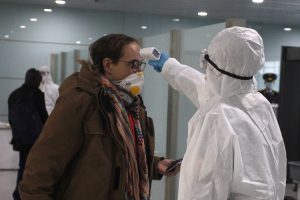A special North Korean flight believed to be carrying dozens of diplomats and other foreigners arrived in Russia’s Far East on Monday, as the North tightens a lockdown intended to fend off the coronavirus.
North Korea has not publicly confirmed a single case of the COVID-19 illness, but its state media have reported that thousands of people have been quarantined as part of strict prevention measures.
Seemingly dozens of passengers, most of them wearing face masks and some accompanied by children, lined up at Pyongyang International Airport. North Korean health workers wearing white protective suits scanned them for fevers.
North Korea lifted a monthlong quarantine on foreign diplomats based in Pyongyang on March 2, allowing them to leave the country if needed.
A total of 103 passengers — 63 foreigners and 40 North Koreans — were on Air Koryo Flight 271 that arrived in Vladivostok International Airport Monday morning, according to German diplomats who were on the plane. It wasn’t immediately clear whether North Korea would arrange additional flights to evacuate foreigners.
“It is business as normal, but you can see that everybody wears their masks, like you do, but without exception, everybody does that and there is certain tension in the city and all over the country,” Pit Heltmann, German’s ambassador to Pyongyang, said about the situation in North Korea’s capital and elsewhere.
Another German diplomat, Klaus Stross, first secretary of the country’s embassy in Pyongyang, said most North Korean schools have been closed although they are supposed to open at the end of March. He said he saw no major disruptions in public life or construction activity.
“Everybody is hoping for flights to resume, for borders to reopen, but in Pyongyang you don’t feel any restrictions … people are wearing masks, but that’s about all,” he said.
Colin Crooks, the British ambassador to Pyongyang, tweeted, “Sad to say farewell this morning to colleagues from German Embassy and French Office #NorthKorea which are closing temporarily.” He said the British Embassy would remain open.
Rainer Breul, spokesman of Germany’s foreign ministry, blamed the temporary shutdown of the country’s embassy on North Korea’s “disproportionate” anti-virus measures, including the “forced quarantine” of foreign nationals.
“The North Korean authorities said that these measures would last, and I quote, at least several months more – that brought us to the decision that normal service would not be possible for the foreseeable future and to bring back the staff,” Breul told reporters in Berlin.
“As soon as the situation normalizes, we plan to resume service at the embassy in Pyongyang.”
The French Foreign Ministry confirmed last week that it plans to temporarily close its cooperation office in Pyongyang.
“North Korea has taken drastic containment measures since the end of January which notably concern foreign representative offices and seriously impede the functioning of the French Cooperation Office in Pyongyang,” the ministry said in a statement to The Associated Press.
North Korea has called its anti-virus campaign a matter of “national existence.” It has banned foreign tourists, shut down nearly all cross-border traffic with China, intensified screening at entry points, and mobilized health workers to monitor residents and isolate those with symptoms.
Many experts say North Korea is highly vulnerable to infectious diseases due to its chronic shortage of medical supplies and outdated health care infrastructure.
Its state-run radio station reported Sunday that authorities last week released 1,020 people from quarantine in Kangwon province and 2,630 others in Jagang province.
Previous state media reports said at least 7,000 North Koreans had been quarantined, including 3,000 in North Phyongan province, 2,420 in South Phyongan province, and 1,500 others in Kangwon.
North Korea said Friday that it freed 221 foreign nationals from a monthlong quarantine. At least 160 others were believed to remain under quarantine as the North said it initially placed more than 380 foreign nationals under “strict confined medical observation.”
Yoh Sang-key, spokesman for South Korea’s Unification Ministry, said Monday that North Korea isn’t responding to South Korean proposals for joint quarantine efforts.
North Korea had the South withdraw dozens of officials from an inter-Korean liaison office in the North Korean border town of Kaesong in January, insisting on closing it until the epidemic is controlled.
By Kim Tong-hyung and Hyung-jin Kim for the Associated Press. Associated Press writers Harriet Morris in Moscow, Geir Moulson in Berlin and Sylvie Corbet in Paris contributed to this report.
































